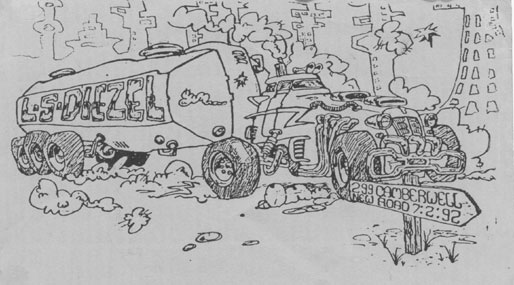|
A Short History of Music in South London John Heathcote |
|||
|
South London has always been at the cutting edge of the capital's underground and cosmopolitan culture. It's tradition of villainy was well established by medieval times, when Southwark and the South Bank were under the authority of the Bishop of Southwark, and crossing to the Southside was a favourite escape route from the City Constabulary. The tavern culture grew up around the docks, from Woolwich, to Greenwich and Deptford; from where the ships of the British Empire sailed out to plunder the world. Merchant ships arrived from around the globe giving their crews the chance to take in the local hospitality. The combination of exotic cosmopolitan and bohemian was probably well established by the time that Christopher Marlowe was murdered in a Deptford pub in the 17th Century. After the war, South London's boundaries were extended into what had previously been countryside; as a means of housing all those from the East End and Docklands whose homes had been flattened by Nazi bombs. In the southside inner city many of the old back to backs were replaced with housing estates of blocks up to twenty stories high, connected by paths and walkways. Of course, instead of being replaced eventually by proper housing as promised originally, they were used to house the long term unemployed, 'problem' tenants, and immigrant families. Most South London Councils imposed covert racist housing policies; separating black, poor white, and middle-class white into different areas with all the predictable consequences for policing and local economies. The need for workers to aid reconstruction caused the Government to encourage people from those countries which had previously been regarded as colonies of the Empire, such as the West Indies, and the Indian sub continent to take up their rights to British citizenship, and move here with their families. However, one of the legacies of Empire is that the natives of the "home country" have to be indoctrinated with some sort of feeling of superiority to foreigners, to justify the conquest of fellow human beings and the consequent destruction of their culture. This meant that when the first families arrived in London, they soon realised that they had to overcome the resentment and prejudice of their fellow citizens, despite the fact that many of the new arrivals had fought to protect this country in the recent World War. This resulted in the Riots in Notting Hill in the 1950's, the area in North London, which like Brixton in South London, became the main concentration of the black communities until the 60's. The children of these immigrants were almost automatically condemned to the estates, along with their poor white counterparts. Ironically, it was this policy which undermined the efforts of the racist parties of the 70's. There is a unity in poverty which can defeat ignorance and defy hatred; which does not justify poverty, but gives it's victims a potential strength which is incomprehensible to those who have always lived amongst the comfortable. One of the main focuses of the anarchistic punk "movement" of the 70's was through the Anti-Nazi League, which along with Ken Livingstone's Greater London Council (GLC), promoted many of the urban festivals and gigs. This gave bands who had previously only played to an "underground" audience the chance to play to thousands. South London's pub culture also gave rise to at least two mega-pub bands; Dire Straits, and Squeeze, (in the same way that the early Seventies produced Robert Palmer and Elkie Brooks from South London blues band Vinegar Joe, and the Sixties had produced Manfred Mann and The Rolling Stones). Because of the availability at the time of cheap housing on the council estates and endless rows of squatted houses from whence the owners had long since fled to the suburbs, to escape the dereliction; areas such as New Cross and Deptford contained an intriguing mixture of culture and character. People attracted by the bright lights, who hadn't quite made it, or hadn't yet made it, or never would make it over the river to the pot of gold; and either didn't care, or cared too much to ever get there in one piece; all ended up in the squats, the shortlife, and on the estates. In 1976 the movement which became known as punk started to emerge from the Teflon claustrophobia of 70's British culture, and was taken from the art schools and clubs of the West End and transformed into an urban anarchy which drew in both hippy survivors, squatters and disillusioned youth from the sink estates suburban tedium. Despite its short lifespan - PUNK defined an attitude and world view which still informs the underground.
|
|||



